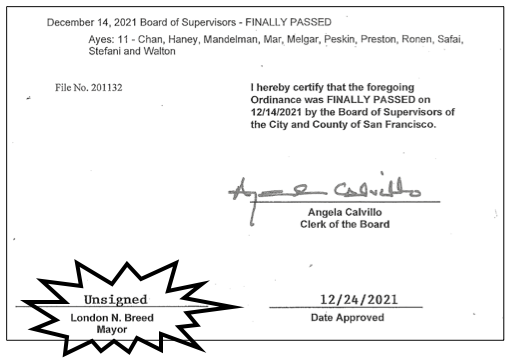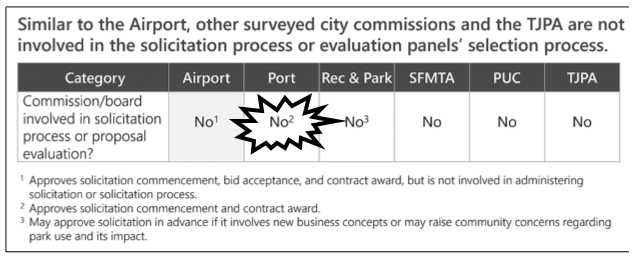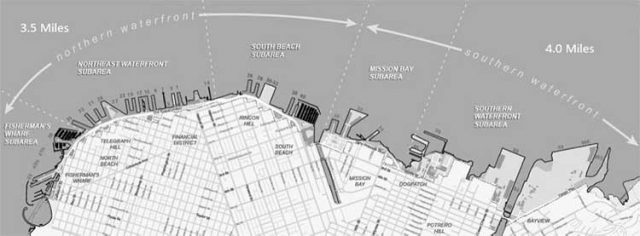This is the introduction to an investigative report that will be sent to newsletter subscribers. To be the first to receive it, sign up for free here: https://susanreynolds.substack.com/
“It is clear from the context that the primary purpose of such a behested payment would have been to secure a commissioner’s support for a valuable City contract that should have been awarded through established, merit-based contracting procedures. This incident is a stark example of how behested payments can be used in a pay-to-play scheme if basic ethics rules are not in place.”
— San Francisco Ethics Commission, in its recommendation for the prohibition of behested payments, Dec. 9, 2020
The phrase “tone at the top” was first popularized in the U.S. Sarbanes-Oxley Act of 2002, which highlighted poor leadership as the primary cause of the biggest corporate failures, including Enron and WorldCom. “Painfully, these scandals exposed widespread arrogance, fraud, conflicts-of-interest, preferential treatment, and a collective failure among the gatekeepers charged with oversight and maintaining the public trust,” said management consultant Deloitte in its report, Tone at the Top: The First Ingredient in a World-Class Ethics and Compliance Program.
San Francisco’s leaders should heed those words.
In April of 2019, I penned a column about Mohammed Nuru, the head of the city’s Public Works department (“It’s time for Mayor Breed to sweep DPW boss to the curb”) in which I pointed out that, despite ethical missteps, misappropriated taxpayer funds, lawsuits, and incompetence as the leader of street cleaning in one of the world’s filthiest cities, Nuru had thrived under four mayors and numerous boards of supervisors. All of them knew, in one way or another, that Nuru was as crooked as Lombard Street, yet he was promoted to director of DPW, which gave him even more access to shady deals and shady cohorts he had cultivated over the years.
Ten months later, on the morning of Jan. 29, 2020, Nuru was arrested by the FBI. “The complaint alleges corruption pouring into San Francisco from around the world,” said David Anderson, then-U.S. attorney for the Northern District of California, accusing Nuru of “corruption, bribery, kickbacks, and side deals.”
Many other city officials have gone down in the still-active investigation, and the tone at the top, from Mayor London Breed to the current lot of supervisors, has been tepid. Everyone who has been at City Hall for any length of time has skeletons in their own closets, which means — despite legislation and impassioned speeches — corruption continues unfettered.
On Feb. 4, 2020, two weeks following Nuru’s arrest, Mayor Breed declared, “Nothing matters more than restoring the public trust in our government. Our residents deserve it, and the hard-working men and women of our city deserve it. This requires us to not only hold anyone involved in any illegal or unethical actions accountable, but also to do the work to prevent corruption from occurring in our city.”
Then, on Aug. 13, 2021, the San Francisco Ethics Commission fined Breed $22,792 for four counts of violating city campaign finance, ethics, and gift laws. The violations included sending a letter on her official stationery to then-governor Jerry Brown trying to get her brother, serving life in prison for murder, a reduced sentence. But she also got slapped on the wrist for taking payment for a parade float from Nick Bovis, owner Lefty O’Doul’s restaurant, who was arrested as one of Nuru’s accomplices (both pled guilty to honest services fraud), and for taking nearly $6,000 from Nuru for “car repairs.” Breed disclosed this after I reported receiving handwritten letters and firsthand accounts from DPW workers about Breed and Nuru having an intimate relationship in my February 2020 column (“Mohammed Nuru finally swept to the curb, but not by Mayor Breed”). She made the announcement in a Medium post on Valentine’s Day (seriously, I can’t make this stuff up).
TONEDEAF AT THE TOP
You would think Breed would have learned her lesson and changed to a more decisive tone at the top (“I was wrong, and I want to make sure it never happens again”), but instead, on Christmas Eve, 2021, she quietly returned the city’s new Behested Payments Ordinance (BPO) unsigned. The ordinance went into effect 30 days after the Board’s unanimous approval, meaning Breed’s gesture was purely symbolic, but it still spoke volumes.
So did a 14-page letter Breed sent “seeking guidance” on the ordinance from City Attorney David Chiu and the Ethics Commission, where the word “corruption” is never mentioned and “behested” only comes up three times. “Donations” and “philanthropy” appear 18 times each, as Breed worries aloud that enforcement of the BPO could prevent city officials from raising private funds to benefit issues like homelessness and underserved communities.
The drama is unnecessary, of course, as are behested payments — Breed just signed a $14 billion budget, which should be more than enough to go around.

NURU, BOVIS, JONES, AND THE PORT OF SAN FRANCISCO
The “business as usual” culture at City Hall has infected every department, and the Port of San Francisco, which manages 7.5 miles of city waterfront and reports to the five-member Port Commission, is no exception.
In my column exposing the San Francisco Public Utilities Commission’s Community Benefits pay-to-play scheme (“Friends with Community Benefits,” July 2020), I predicted a few major players would be hearing from the FBI, including SFPUC General Manager Harlan Kelly Jr., his chief strategy officer, Assistant General Manager of External Affairs (and girlfriend) Juliet Ellis, and their close ally and lobbyist, Dwayne Jones. Since then, Kelly has been arrested and documents related to Ellis have been subpoenaed, but Jones is still getting lucrative city contracts, including from the port. In fact, as I wrote in my February column, Jones’s company RDJ Enterprises is one of their go-to vendors, inking a deal for community relations related to the Seawall Resiliency Project in 2017. The original fee for Jones’s work was $198,039; in a 2019 amendment, it was raised to $278,421 and, as of late 2021 — with the Port Commission well aware of his connection to the SFPUC Community Benefits scandal — it was running at $398,362, more than double the initial amount.
Jones isn’t the only port contract beneficiary linked to scandal. Lefty O’Doul’s Foundation for Kids, a nonprofit run by Bovis and used by Nuru to launder behested payments, bribes, and kickbacks, had Port Commission Vice President Kimberly Brandon — a Willie Brown appointee who has served on the Port Commission for 25 years — sitting alongside Bovis on its board.
Nuru was also the go-between for Oakland-based construction firm PrōVen and the port, where bribery led to a successful bid. Two of the company’s executives, President Alan Varela and Vice President William Gilmartin III, were accused of giving Nuru the infamous $40,000 tractor in exchange for his help with opening an asphalt plant on the waterfront.
PORT ‘PANEL STACKING’
In the wake of the Nuru and Bovis arrests and in relation to their involvement in a separate bribery scheme at San Francisco International Airport, the San Francisco Office of the Controller Public Integrity Review Unit (CPIR) questioned the Airport Commission regarding the integrity of its contract award process.
According to its Jan. 11, 2021, report, “Ethical Standards for Contract Award Processes of the Airport Commission and Other Commissions and Boards,” CPIR found that airport commissioners were “appropriately excluded from participating in the selection process for evaluation panels.” CPIR then posed the same question to port leadership, who denied its commissioners were “involved in the solicitation process or evaluation panel selection process.”
Evidence suggests otherwise, however, particularly when it comes to “panel stacking” — an agency’s ability to configure evaluation committees and steer contracts to preferred vendors.

On Oct. 22, 2019, during a public Port Commission meeting, Brandon seemed overly interested in the evaluation panel selection for the upcoming Requests for Proposals (RFPs) on the Piers 38–40 and Piers 30–32 redevelopment projects. The evaluation panel scores the bids for a project that determines the outcome, with the highest-ranked proposal receiving the contract award. At one point, Brandon asked Port Executive Director Elaine Forbes how many people would be on the panel, peppering her with questions. “Is four a good number? Don’t you usually need an odd number? When is that decision going to be made? Who is going to be on the panel? When are you going to let the commission know or have some, any involvement in who’s on the panel?” The Port Commission later chose the panelists for the two pier redevelopment projects behind closed doors.
The Piers 38–40 contract is currently on the Port Commission’s July 12 docket. The developer originally proposed project costs of $383 million, but those costs have since ballooned an additional 40 percent to $536 million, likely to cover the inadequate resiliency design of the original proposal. The Port Commission has already signaled its planned acceptance of the additional $153 million expense.
The panel-stacking development prompted a wider investigation into Port of San Francisco contract awards. The Marina Times started with the infamous PrōVen bribery scheme, then we drilled down on the Piers 38–40 and Piers 30–32 contracts, and finally, we examined the related Embarcadero Seawall Project. During our months-long investigation, we discovered that the port covertly stacked its evaluation panels for each of the four contract awards.
Most disturbing, the panels scored and ranked all four contract awards out of the public eye. The panel for PrōVen — which included two of Nuru’s DPW deputies — overwhelmingly scored the TractorGate firm as the winner, while flunking its three competitors. Other startling findings and patterns emerged, ranging from no-bid contracts to giving away free waterfront office space to friends. Through public documents and videos of commission hearings, we even discovered the port is using the waterfront resiliency design of a developer eliminated during their selection process.
Sign up for Susan’s free newsletter to receive the investigative report as well as future reports.
Follow Susan and the Marina Times on Twitter: @SusanDReynolds and @TheMarinaTimes.




